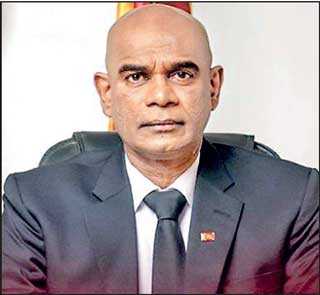Wednesday Feb 18, 2026
Wednesday Feb 18, 2026
Friday, 25 October 2019 00:25 - - {{hitsCtrl.values.hits}}
National People’s Movement (NPM) presidential candidate and former Army Commander Gen. (Rtd) Mahesh Senanayake expressed his confidence that if elected as President, he will have adequate
 |
Mahesh Senanayake |
powers to bring effective change, in spite of downgraded executive powers under the 19th Amendment.
Senanayake made the observation yesterday at the NPM election policy launch, held at the Foundation Institute, Colombo. He downplayed the concerns about his health, pointing out that he was fatigued at the time, but claimed he was in good health.
Former Auditor General and NPM leader Gamini Wijesinghe, introducing the policy for the Presidential Election, explained that the NPM aimed to bring change to the island through constitutional reforms and modernisation of the legal system. He pointed out that the policies of the NPM intended to manage and overcome the national debt crisis, and identify and promote suitable industrial projects, which would make Sri Lanka progress and become sustainable.
Commenting on NPM’s policy, titled ‘One Country - One Law’, Senanayake claimed that a core issue plaguing Sri Lanka was that the President, Prime Minister and Cabinet Ministers were above the law. He claimed that only an independent President was capable of changing it, pointing out that if elected he would create a system of governance which was accountable to the law and the people.
NPM’s policies on national security pledge to reorganise the Ministry of Defence (MOD) and the national intelligence apparatus. According to the policy document, laws will be enacted to prevent the use of political office to influence the Police or the armed forces. The armed forces and Police are to be reorganised and modernised, to face emerging threats and conduct mainstay traditional defence duties. The security focus on non-traditional threats will include counter-radicalisation, counterterrorism, mitigating implications on Sri Lanka due to geo-political power plays in the Indian Ocean region, and disaster resilience mitigation.
Senanayake stressed the need to create a climate where extremism and racism will not be tolerated. “Above all, we need to create a disciplined political culture,” he said. Devolution of power will be reviewed, including the funds for programs decentralised to the Local Government authorities. Local Government Elections are to be held according to the new mixed system.
Senanayake’s policy document brings sweeping reforms to the public sector and judiciary. It pledges to bring all Government servants under the Establishment Code, with no exceptions for politicians. The appointment of the head of the Bribery Commission is to be vested in the Constitutional Council.
Special Courts are planned to hear corruption-related cases, and those found guilty are to be barred for holding public office. All courts will be required by law to adjudicate cases within a stipulated time scale, and the appointment of High Court judges is to be by the Chief Justice, guided by the Judicial Services Commission.
The policy outlines that all development goals will be planned by a professionally qualified board, and the existing policies will be re-structured. It pledges a growth and stability-oriented independent monetary policy, free of Government intervention, and Public Private Partnership (PPP) in all infrastructure and public utility development. According to the document, the fiscal stability of the country is a priority, and it further pledges that taxation will be made simple and stable, with no ad hoc changes.
The manifesto claims that a Senanayake-led Government will build resistant MSMEs, by creating an MSME development authority which includes private sector consultations.